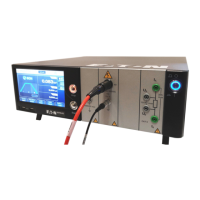User manual SEFELEC 5x Series 187 v1.06
ENVIRONMENTAL INFLUENCES
Temperature, pressure and humidity conditions have an influence on the dielectric tests results.
19.3.1. TEMPERATURE
The temperature having an influence on the gas density, this one is altering the performances
of the liquid or gaseous insulating material. The oils, often used as insulation are never pure,
the dissolved quantity of gas increases with the temperature and is decreasing the insulation
quality of the oil. The large variety of materials used as solid insulation does not allow to de-
duce a general rule on their behaviour with the temperature (the insulation specifications hav-
ing a tendency to dissipate when the temperature increases).
19.3.2. PRESSURE
The withstand voltage in gas changes with the pressure following the Paschen’s law. This law
shows a minimum of the breakdown voltage for a particular value of the pressure by distance
product, otherwise the more the pressure increases, the more the breakdown voltage is high.
The liquids used as dielectric insulation are influenced by the pressure, the dielectric strength
increasing with the pressure. In theory, the solid insulations are a little influenced by the pres-
sure because this one does not modify a lot their thickness and their internal composition.
19.3.3. HUMIDITY
The withstand voltage of gas changes with humidity. In example for the air and for values of
relative humidity < 80%, the dielectric strength increases a little with the humidity increasing (the
water molecules, more dense than the gas, slows down the avalanche phenomena). The water
presence in an insulating liquid such as oil degrades the dielectric strength by water electrolysis,
development of gas producing partial discharges bringing to breakdown. Under combined effect
of the humidity (> 95%) and the temperature (> 100°C) most of the polymers dissipate. The wa-
ter can produce inflating in the insulation and create cracks which will facilitate the electric arcs
advance.

